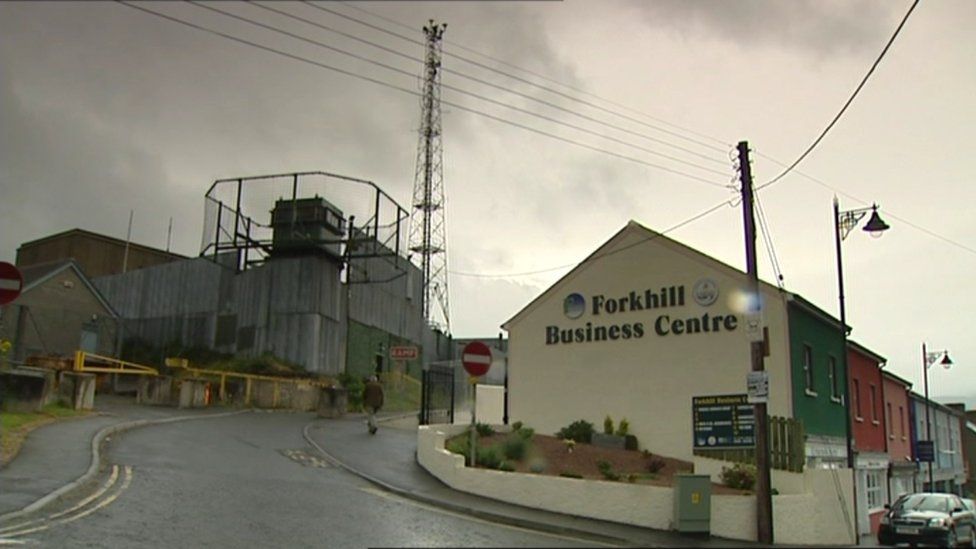County Armagh Army barracks to be transformed
- Published

They once dominated border towns and countryside, but since the end of the Troubles the majority of south Armagh's barracks, checkpoints and watchtowers have been dismantled.
Finding a new use for them has been easier for some than for others.
In Crossmaglen, the army has returned land to the local GAA club.
The Cloughogue checkpoint on the outskirts of Newry that once controlled cross-border traffic is now a free-flowing road.
And in Forkhill the local development association is transforming the village's former barracks.
According to local businessman Brendan Boyle, who is involved in the eight-acre site's development, locals will soon have a facility they can use for work and play.
"The planning application has been received, engineers have been appointed and the design has been done for a new play park for the village on this site," he said.
"We're quite close to the border so our position is quite precarious but our intention would be to develop business units on the other part of the site to take advantage of whatever might happen after Brexit."
'Nothing should be kept'
For Doug Beattie, once a soldier in south Armagh and now an Ulster Unionist MLA, the transformation of the site represents positive progress.
"Coming back now it's nice to see that it has been demilitarised," he said.
"You could not drive in to Forkhill if you were a soldier, you flew in. It is unusual to stand here now.
"Every time I was here previously I had a rifle in my hand. I was wearing body armour and had uniform on, so it is nice to see something different from the late '80s and early '90s.
"I can look at army barracks across Northern Ireland and say that I've served there - whether that is Killymeal House in Dungannon, Borucki Sanger in Crossmaglen, be that in Bessbrook Mill.
"They were all places that soldiers lived and some lived for the very last time. But that doesn't mean there has to be a sign everywhere we put our foot.
"Nothing should be kept of the barracks, nothing. It is right that it goes.
"I think it would be nice to return this site to a place where mothers and children can sit.
"There is stunning scenery here and it would be good if they could just enjoy this as an open piece of land."
The mood music is different in Bessbrook where things have gone quiet.
Once home to one of the busiest heliports in the world, with helicopters taking off and landing every eight minutes, there had been plans to develop 272 homes, offices, a play park and parkland on the expansive Bessbrook Mill site that the army left in 2007.
But the local council has confirmed that planning permission for such a development lapsed in early 2007.
'Horrendous'
For local photographer John Davis, who lives immediately adjacent to the Mill, life has changed dramatically since the Army's departure.
"The noise was horrendous," he said.
"We got sound insulation which cut the sound down dramatically but before that there was non-stop flying. Always in the background you had this constant clattering.
"We were in a control zone behind the barriers where nobody was allowed in and out, only ourselves.
"Even when I was coming in and out there were constant checkpoints. You would have your licence checked, your boot checked, your bonnet opened, mirrors underneath the car.
"When the helicopters stopped flying there was this eerie feeling of silence," he said.
"It was strange you were hearing helicopters for a year afterwards then you were looking up in the sky and there was none there. You were so tuned in to hearing them coming in and out."
Peace opened south Armagh up to people who previously wouldn't have visited and investment has followed.
Initial investments were of the publicly-funded variety - with the Slieve Gullion Forest Park and Camlough Lake now attracting hundreds of thousands of visitors each year.
Private investment has followed, notably at Killeavy Castle on the slopes of Slieve Gullion where a multi-million pound spa hotel is scheduled to open in March 2019.
But locals fear future investments are dependent on free movement. And for that reason, reminders of the past remain powerful.
- Published10 March 2017